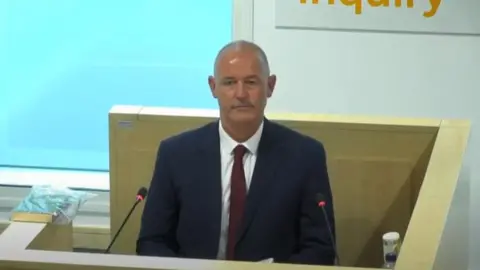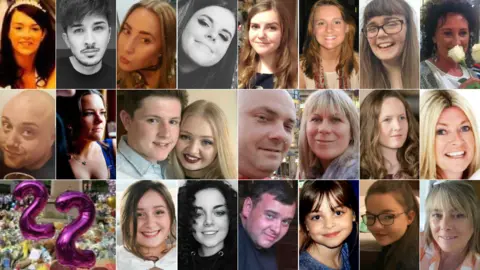Manchester Arena Inquiry: Fire crew bomb response was 'gross failure'
 Manchester Arena Inquiry
Manchester Arena InquiryFire crews should have got to the Manchester Arena bombing in about four minutes instead of more than two hours, an inquiry has heard.
Peter O'Reilly, the region's chief fire officer on the night, blamed communication failures for the delay.
He said he realised he had failed personally when he saw on television ambulances arriving at midnight.
Twenty-two people were killed in the suicide bombing on 22 May 2017 at the end of an Ariana Grande concert.
Hundreds more were injured when Salman Abedi, 22, detonated a home-made device in the arena's City Room foyer at 22:31 BST.
'Information vacuum'
The public inquiry into the atrocity was told fire crews arrived two hours and six minutes after the blast.
Mr O'Reilly, who was Greater Manchester Fire and Rescue Service (GMFRS) Chief Fire Officer on the night, said they could and should have attended within about four minutes.
Paul Greaney QC, counsel to the inquiry, said firefighters had been further delayed on arrival because they did not enter the station for another 13 minutes and "even then did so despite of command and not because of it".
He said: "Do you agree that represents not just a failure in response but a gross failure in response?"
Mr O'Reilly, who retired in February 2018, replied: "If I could find stronger words I would use them but yes."
 Family handouts
Family handoutsHe added that "there was a mixture of fright, a mixture of disappointment and a mixture of confusion" in the command room.
The inquiry has previously heard how the fire service response was a "catastrophe", as senior officers argued over who to deploy.
Mr O'Reilly said on the night of the bombing "communications or lack thereof" left GMFRS operating and making decisions in an "information vacuum".
The inquiry heard that he had previously said after the bomb "that as a firefighter it would kill me if I found out that we could have saved more people by getting there quicker but I also know that the FBU (Fire Brigades Union) and the HSE (Health and Safety Executive) would have had me in the dock if firefighters had been sent directly to the scene and had been killed by a terrorist".
However he denied that fear ever featured in his thoughts on the night while making decisions.
The inquiry continues.

Why not follow BBC North West on Facebook, Twitter and Instagram? You can also send story ideas to [email protected]
